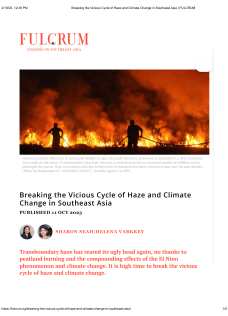Peatlands in Southeast Asia (SEA) are globally important as carbon sinks and megadiverse ecosystems. However, agribusiness-driven land-use change and drainage have caused peatland degradation and underground peat fires, which generate “haze” air pollution and lead to significant economic losses and health impacts. Haze and climate change are connected, with peat burning emitting significant amounts of greenhouse gases (GHG) and pollutants – projected to increase with climate change due to increasing droughts. However, these issues are largely treated separately in policy and governance, both a challenge for management and a lost opportunity for sustainability. Our study will first summarise GHG emissions and removals data and provide recommendations for addressing uncertainty. Differences in data standards and transparency have inhibited haze governance, with emissions uncertainty feeding disputes over haze severity and responsibility for fires. We will then assess how new corporate, national and regional GHG mitigation priorities (e.g. carbon trading) and certification schemes (i.e. RSPO) could be integrated to improve sustainable development from the perspective of land use policy, governance and community livelihoods. Through collaboration with peatland communities and developing a knowledge exchange network, we will identify approaches that can enhance Nature-based Solutions (NbS) and sustainable development in SEA’s peatlands (esp. GHGs and haze).
Project Leader
Collaborators
Project publications

Mitigating carbon emissions and haze in Southeast Asia’s peatlands: Opportunities and challenges in integrating policy and governance

Participatory Climate Governance: Insights From Indonesia’s Peatlands

Peatlands and the Climate: This year’s COP29 must build on COP28





